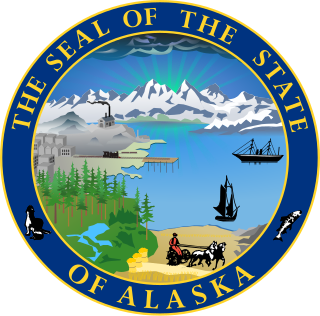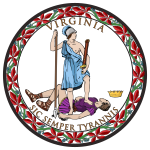
Ballot Measure 2 of 1998 is a ballot measure, since ruled unconstitutional, that added an amendment to the Alaska Constitution that prohibited the recognition of same-sex marriage in Alaska. The Ballot measure was sparked by the lawsuit filed by Jay Brause and Gene Dugan, after the two men were denied a marriage license by the Alaska Bureau of Vital Statistics. In Brause v. Bureau of Vital Statistics, 1998 WL 88743, the Alaska Superior Court ruled that the state needed compelling reason to deny marriage licenses to same-sex couples and ordered a trial on the question. In response, the Alaska Legislature immediately proposed and passed Resolution 42, which became what is now known as Ballot Measure 2. Ballot Measure 2 passed via public referendum on November 3, 1998, with 68% of voters supporting and 32% opposing. The Bause case was dismissed following the passage of the ballot measure.

Wisconsin Referendum 1 of 2006 was a referendum on an amendment to the Wisconsin Constitution that would invalidate same-sex marriages or any substantially similar legal status. The referendum was approved by 59% of voters during the general elections in November 2006. All counties in the state voted for the amendment except Dane County, which opposed it. The constitutional amendment created by Referendum 1 has been effectively nullified since June 26, 2015, when the United States Supreme Court ruled in Obergefell v. Hodges that state-level bans on same-sex marriage are unconstitutional.

South Carolina Amendment 1 of 2006 amended the South Carolina Constitution to make it unconstitutional for the U.S. state to recognize or perform same-sex marriages or civil unions. The referendum was approved by 78% of voters. Unlike the other sixteen such state amendments, South Carolina's explicitly disavows any effort to prevent private contracts between same-sex partners from being recognized—Virginia being the only state to do so.

Nebraska Initiative 416 was a 2000 ballot initiative that amended the Nebraska Constitution to make it unconstitutional for the state to recognize or perform same-sex marriage, same-sex civil unions or domestic partnerships. The referendum was approved on November 7, 2000, by 70% of the voters. The initiative has since been struck down in federal court and same-sex marriage is now legally recognized in the state of Nebraska.

Constitutional Amendment 3 of 2004, is an amendment to the Arkansas Constitution that makes it unconstitutional for the state to recognize or perform same-sex marriages or civil unions. The referendum was approved by 75% of the voters.

Kentucky Constitutional Amendment 1 of 2004, is an amendment to the Kentucky Constitution that made it unconstitutional for the state to recognize or perform same-sex marriages or civil unions. The referendum was approved by 75% of the voters.

Oklahoma Question 711 of 2004, was an amendment to the Oklahoma Constitution that defined marriage as the union of a man and a woman, thus rendering recognition or performance of same-sex marriages or civil unions null within the state prior to its being ruled unconstitutional. The referendum was approved by 76 percent of the voters.

2006 Virginia Question 1, the Marshall-Newman Amendment is an amendment to the Constitution of Virginia that defines marriage as solely between one man and one woman and bans recognition of any legal status "approximat[ing] the design, qualities, significance, or effects of marriage". The amendment was ratified by 57% of the voters on November 7, 2006. It became part of the state Constitution as Section 15-A of Article 1. In 2014, the amendment was ruled unconstitutional in Bostic v. Schaefer.

North Carolina Amendment 1 was a legislatively referred constitutional amendment in North Carolina that amended the Constitution of North Carolina to prohibit the state from recognizing or performing same-sex marriages or civil unions. The amendment did not prohibit domestic partnership agreements, but defined male–female marriage as "the only domestic legal union" considered valid or recognized in the state. On May 8, 2012, North Carolina voters approved the amendment, 61% to 39%, with a voter turnout of 35%. On May 23, 2012, the amendment took effect.
The U.S. state of Texas issues marriage licenses to same-sex couples and recognizes those marriages when performed out-of-state. On June 26, 2015, the United States legalized same-sex marriage nationwide due to the U.S. Supreme Court's decision in Obergefell v. Hodges. Prior to the U.S. Supreme Court's ruling Article 1, Section 32, of the Texas Constitution provided that "Marriage in this state shall consist only of the union of one man and one woman," and "This state or a political subdivision of this state may not create or recognize any legal status identical or similar to marriage." This amendment and all related statutes have been ruled unconstitutional and unenforceable. Some cities and counties in the state recognize both same-sex and opposite-sex domestic partnerships.

The 2010 Virginia State Elections took place on Election Day, November 2, 2010, the same day as the U.S. House elections in the state. The only statewide elections on the ballot were three constitutional referendums to amend the Virginia State Constitution. Because Virginia state elections are held on off-years, no statewide officers or state legislative elections were held. All referendums were referred to the voters by the Virginia General Assembly.

The 2002 Virginia State Elections took place on Election Day, November 5, 2002, the same day as the U.S. Senate and the U.S. House elections in the state. The only statewide elections on the ballot were two constitutional referendums to amend the Virginia State Constitution and two government bond referendums. Because Virginia state elections are held on off-years, no statewide officers or state legislative elections were held. All referendums were referred to the voters by the Virginia General Assembly.

The 1998 Virginia State Elections took place on Election Day, November 3, 1998, the same day as the U.S. House elections in the state. The only statewide elections on the ballot were five constitutional referendums to amend the Virginia State Constitution. Because Virginia state elections are held on off-years, no statewide officers or state legislative elections were held. All referendums were referred to the voters by the Virginia General Assembly.

The 1996 Virginia State Elections took place on Election Day, November 5, 1996, the same day as the presidential, U.S. Senate, and U.S. House elections in the state. The only statewide elections on the ballot were five constitutional referendums to amend the Virginia State Constitution. Because Virginia state elections are held on off-years, no statewide officers or state legislative elections were held. All referendums were referred to the voters by the Virginia General Assembly.

The 1992 Virginia State Elections took place on Election Day, November 3, 1992, the same day as the U.S. Presidential and the U.S. House elections in the state. The only statewide elections on the ballot were one constitutional referendum to amend the Virginia State Constitution and three government bond referendums. Because Virginia state elections are held on off-years, no statewide officers or state legislative elections were held. All referendums were referred to the voters by the Virginia General Assembly.

The 1990 Virginia State Elections took place on Election Day, November 5, 1990, the same day as the U.S. Senate and U.S. House elections in the state. The only statewide elections on the ballot were four constitutional referendums to amend the Virginia State Constitution. Because Virginia state elections are held on off-years, no statewide officers or state legislative elections were held. All referendums were referred to the voters by the Virginia General Assembly.

The 1980 Virginia State Elections took place on Election Day, November 4, 1980, the same day as the U.S. Presidential and U.S. House elections in the state. The only statewide elections on the ballot were four constitutional referendums to amend the Virginia State Constitution. Because Virginia state elections are held on off-years, no statewide officers or state legislative elections were held. All referendums were referred to the voters by the Virginia General Assembly.

The 1978 Virginia State Elections took place on Election Day, November 7, 1978, the same day as the U.S. House elections in the state. The only statewide elections on the ballot were one constitutional referendums to amend the Virginia State Constitution and one statutory referendum. Because Virginia state elections are held on off-years, no statewide officers or state legislative elections were held. All referendums were referred to the voters by the Virginia General Assembly.

The 1970 Virginia State Elections took place on Election Day, November 3, 1970, the same day as the U.S. Senate and U.S. House elections in the state. The only statewide elections on the ballot were four constitutional referendums to amend the Virginia State Constitution. All referendums were referred to the voters by the Virginia General Assembly.

The 2018 Virginia State Elections took place on Election Day, November 6, 2018, the same day as the U.S. Senate and U.S. House elections in the state. The only statewide election on the ballot were two constitutional referendums to amend the Virginia State Constitution. Because Virginia state elections are held on off-years, no statewide officers or state legislative elections were held. The referendum was referred to the voters by the Virginia General Assembly. The amendment easily passed, although final vote totals await the final certification of results by the state board of elections.









